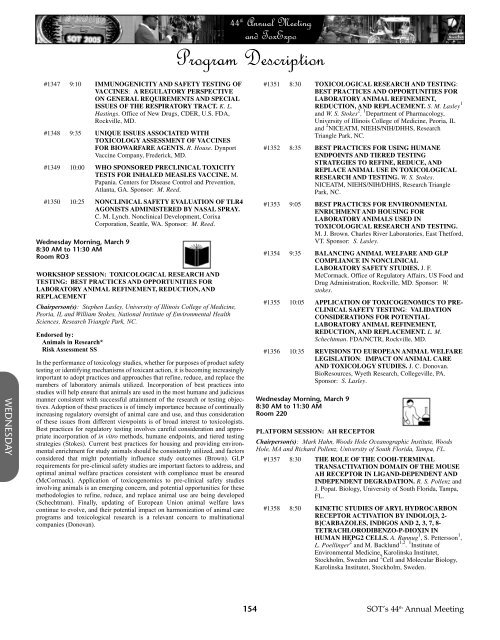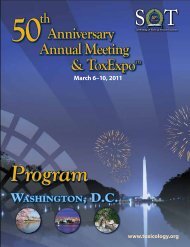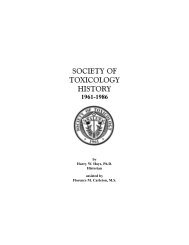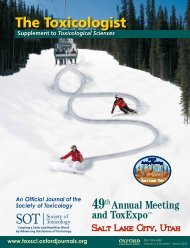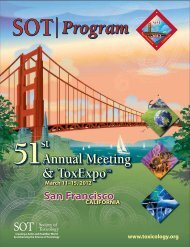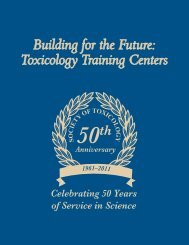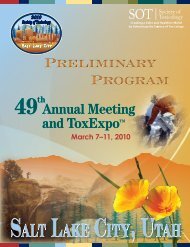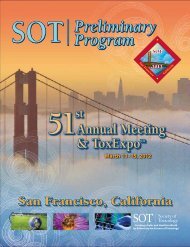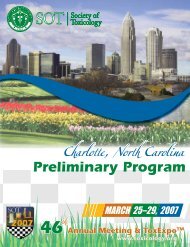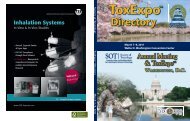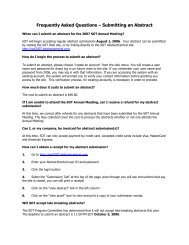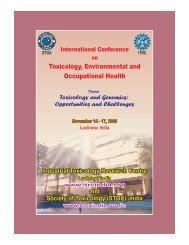Program - Society of Toxicology
Program - Society of Toxicology
Program - Society of Toxicology
You also want an ePaper? Increase the reach of your titles
YUMPU automatically turns print PDFs into web optimized ePapers that Google loves.
44 th Annual Meeting<br />
and ToxExpo<br />
<strong>Program</strong> Description<br />
WEDNESDAY<br />
#1347 9:10 IMMUNOGENICITY AND SAFETY TESTING OF<br />
VACCINES: A REGULATORY PERSPECTIVE<br />
ON GENERAL REQUIREMENTS AND SPECIAL<br />
ISSUES OF THE RESPIRATORY TRACT. K. L.<br />
Hastings. Office <strong>of</strong> New Drugs, CDER, U.S. FDA,<br />
Rockville, MD.<br />
#1348 9:35 UNIQUE ISSUES ASSOCIATED WITH<br />
TOXICOLOGY ASSESSMENT OF VACCINES<br />
FOR BIOWARFARE AGENTS. R. House. Dynport<br />
Vaccine Company, Frederick, MD.<br />
#1349 10:00 WHO SPONSORED PRECLINICAL TOXICITY<br />
TESTS FOR INHALED MEASLES VACCINE. M.<br />
Papania. Centers for Disease Control and Prevention,<br />
Atlanta, GA. Sponsor: M. Reed.<br />
#1350 10:25 NONCLINICAL SAFETY EVALUATION OF TLR4<br />
AGONISTS ADMINISTERED BY NASAL SPRAY.<br />
C. M. Lynch. Nonclinical Development, Corixa<br />
Corporation, Seattle, WA. Sponsor: M. Reed.<br />
Wednesday Morning, March 9<br />
8:30 AM to 11:30 AM<br />
Room RO3<br />
WORKSHOP SESSION: TOXICOLOGICAL RESEARCH AND<br />
TESTING: BEST PRACTICES AND OPPORTUNITIES FOR<br />
LABORATORY ANIMAL REFINEMENT, REDUCTION, AND<br />
REPLACEMENT<br />
Chairperson(s): Stephen Lasley, University <strong>of</strong> Illinois College <strong>of</strong> Medicine,<br />
Peoria, IL and William Stokes, National Institute <strong>of</strong> Environmental Health<br />
Sciences, Research Triangle Park, NC.<br />
Endorsed by:<br />
Animals in Research*<br />
Risk Assessment SS<br />
In the performance <strong>of</strong> toxicology studies, whether for purposes <strong>of</strong> product safety<br />
testing or identifying mechanisms <strong>of</strong> toxicant action, it is becoming increasingly<br />
important to adopt practices and approaches that refine, reduce, and replace the<br />
numbers <strong>of</strong> laboratory animals utilized. Incorporation <strong>of</strong> best practices into<br />
studies will help ensure that animals are used in the most humane and judicious<br />
manner consistent with successful attainment <strong>of</strong> the research or testing objectives.<br />
Adoption <strong>of</strong> these practices is <strong>of</strong> timely importance because <strong>of</strong> continually<br />
increasing regulatory oversight <strong>of</strong> animal care and use, and thus consideration<br />
<strong>of</strong> these issues from different viewpoints is <strong>of</strong> broad interest to toxicologists.<br />
Best practices for regulatory testing involves careful consideration and appropriate<br />
incorporation <strong>of</strong> in vitro methods, humane endpoints, and tiered testing<br />
strategies (Stokes). Current best practices for housing and providing environmental<br />
enrichment for study animals should be consistently utilized, and factors<br />
considered that might potentially influence study outcomes (Brown). GLP<br />
requirements for pre-clinical safety studies are important factors to address, and<br />
optimal animal welfare practices consistent with compliance must be ensured<br />
(McCormack). Application <strong>of</strong> toxicogenomics to pre-clinical safety studies<br />
involving animals is an emerging concern, and potential opportunities for these<br />
methodologies to refine, reduce, and replace animal use are being developed<br />
(Schechtman). Finally, updating <strong>of</strong> European Union animal welfare laws<br />
continue to evolve, and their potential impact on harmonization <strong>of</strong> animal care<br />
programs and toxicological research is a relevant concern to multinational<br />
companies (Donovan).<br />
#1351 8:30 TOXICOLOGICAL RESEARCH AND TESTING:<br />
BEST PRACTICES AND OPPORTUNITIES FOR<br />
LABORATORY ANIMAL REFINEMENT,<br />
REDUCTION, AND REPLACEMENT. S. M. Lasley 1<br />
and W. S. Stokes 2 . 1 Department <strong>of</strong> Pharmacology,<br />
University <strong>of</strong> Illinois College <strong>of</strong> Medicine, Peoria, IL<br />
and 2 NICEATM, NIEHS/NIH/DHHS, Research<br />
Triangle Park, NC.<br />
#1352 8:35 BEST PRACTICES FOR USING HUMANE<br />
ENDPOINTS AND TIERED TESTING<br />
STRATEGIES TO REFINE, REDUCE, AND<br />
REPLACE ANIMAL USE IN TOXICOLOGICAL<br />
RESEARCH AND TESTING. W. S. Stokes.<br />
NICEATM, NIEHS/NIH/DHHS, Research Triangle<br />
Park, NC.<br />
#1353 9:05 BEST PRACTICES FOR ENVIRONMENTAL<br />
ENRICHMENT AND HOUSING FOR<br />
LABORATORY ANIMALS USED IN<br />
TOXICOLOGICAL RESEARCH AND TESTING.<br />
M. J. Brown. Charles River Laboratories, East Thetford,<br />
VT. Sponsor: S. Lasley.<br />
#1354 9:35 BALANCING ANIMAL WELFARE AND GLP<br />
COMPLIANCE IN NONCLINICAL<br />
LABORATORY SAFETY STUDIES. J. F.<br />
McCormack. Office <strong>of</strong> Regulatory Affairs, US Food and<br />
Drug Administration, Rockville, MD. Sponsor: W.<br />
stokes.<br />
#1355 10:05 APPLICATION OF TOXICOGENOMICS TO PRE-<br />
CLINICAL SAFETY TESTING: VALIDATION<br />
CONSIDERATIONS FOR POTENTIAL<br />
LABORATORY ANIMAL REFINEMENT,<br />
REDUCTION, AND REPLACEMENT. L. M.<br />
Schechtman. FDA/NCTR, Rockville, MD.<br />
#1356 10:35 REVISIONS TO EUROPEAN ANIMAL WELFARE<br />
LEGISLATION: IMPACT ON ANIMAL CARE<br />
AND TOXICOLOGY STUDIES. J. C. Donovan.<br />
BioResources, Wyeth Research, Collegeville, PA.<br />
Sponsor: S. Lasley.<br />
Wednesday Morning, March 9<br />
8:30 AM to 11:30 AM<br />
Room 220<br />
PLATFORM SESSION: AH RECEPTOR<br />
Chairperson(s): Mark Hahn, Woods Hole Oceanographic Institute, Woods<br />
Hole, MA and Richard Pollenz, University <strong>of</strong> South Florida, Tampa, FL.<br />
#1357 8:30 THE ROLE OF THE COOH-TERMINAL<br />
TRANSACTIVATION DOMAIN OF THE MOUSE<br />
AH RECEPTOR IN LIGAND-DEPENDENT AND<br />
INDEPENDENT DEGRADATION. R. S. Pollenz and<br />
J. Popat. Biology, University <strong>of</strong> South Florida, Tampa,<br />
FL.<br />
#1358 8:50 KINETIC STUDIES OF ARYL HYDROCARBON<br />
RECEPTOR ACTIVATION BY INDOLO[3, 2-<br />
B]CARBAZOLES, INDIGOS AND 2, 3, 7, 8-<br />
TETRACHLORODIBENZO-P-DIOXIN IN<br />
HUMAN HEPG2 CELLS. A. Rannug 1 , S. Pettersson 1 ,<br />
L. Poellinger 2 and M. Backlund 1,2 . 1 Institute <strong>of</strong><br />
Environmental Medicine, Karolinska Institutet,<br />
Stockholm, Sweden and 2 Cell and Molecular Biology,<br />
Karolinska Institutet, Stockholm, Sweden.<br />
154<br />
SOT’s 44 th Annual Meeting


